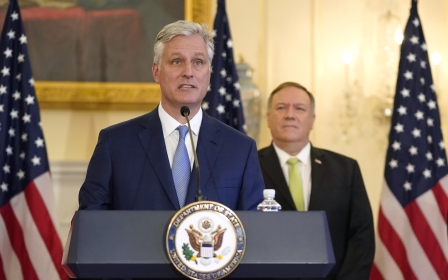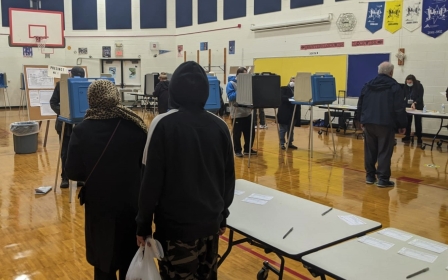Biden vowed to protect free speech, but will he reverse Pompeo's anti-BDS moves?

In almost all of his campaign outreach efforts to Arab-American voters, President-elect Joe Biden vowed to protect free speech concerning economic boycotts of Israel.
Now, civil rights advocates are calling on the incoming president to live up to promises in the 2020 Democratic Party platform and reverse the Trump administration's efforts to penalise organisations that discourage business with Israel or its illegal settlements.
"We, as progressive activists, are really going to have to hold Biden's feet to the fire on this," said Ariel Gold, national co-director of Code Pink, an anti-war group.
"He promised during this campaign to respect that boycott is a protected form of speech. And he needs to follow through with that promise."
Biden is a staunch supporter of Israel and refers to himself as a Zionist. He has resisted calls to impose human rights conditions on aid to Israel and has pledged to keep the assistance flowing no matter what Israel does.
His campaign has also made it clear that he opposes the Palestinian-led Boycott, Divestment and Sanctions (BDS) movement.
Pledging to protect free speech
Still, his opposition to BDS always came with an important caveat - that a Biden administration would not stifle the right to free speech to protect the Israeli government from criticism.
That's what top campaign aide Tony Blinken told Arab-American advocates on a call in July, when he pledged that a President Biden would "protect the constitutional right of our citizens to speak freely".
The campaign expressed that message even more explicitly in a plan for Arab-American communities that was released in August.
"Joe Biden will protect the constitutional right of our citizens to free speech," the platform reads.
The campaign also reiterated Biden's opposition to Israel's ban on US congresswomen Rashida Tlaib and Ilhan Omar over their support for BDS.
'We have to draw the line in the sand about the harm caused by false accusations of antisemitism - when that very real threat is watered down and used as a political tool to oppress Palestinians'
- Ariel Gold, Code Pink
"He also does not support efforts by any democracy to criminalize free speech and expression, which is why he spoke out against Israel’s decision to deny entry to American lawmakers because they favor boycotting Israel," it said of the new president-elect.
The Democratic platform, a non-binding document that set the party's priorities for the next four years, also promised that Democrats would protect free speech.
"We oppose any effort to unfairly single out and delegitimize Israel, including at the United Nations or through the Boycott, Divestment, and Sanctions Movement, while protecting the constitutional right of our citizens to free speech," said the document, which was approved with Biden's support in July.
Dozens of US states have anti-BDS laws that target businesses and individuals that boycott Israel. Still, federal courts have found such legislation in Kansas, Arizona and Texas to be unconstitutional.
On Thursday, US Secretary of State Mike Pompeo advanced, on the federal level, legal and political efforts to protect Israel from boycotts by declaring the BDS movement antisemitic.
He also ordered the State Department's special envoy to combat antisemitism by identifying groups that boycott Israel or the settlements in order to cut ties with them.
"To ensure that Department funds are not spent in a manner that is inconsistent with our government’s commitment to combat anti-Semitism, the State Department will review the use of its funds to confirm that they are not supporting the Global BDS Campaign," read a statement by the State Department.
The decree also applies to foreign NGOs in partnership with Washington.
Stick to his promises
The announcement sparked an outcry from free-speech advocates in the US.
"Criticism of Israel, or any government, is fully protected by the First Amendment," the American Civil Liberties Union said in a tweet. "Threatening to block government funds to groups that criticize Israel is blatantly unconstitutional."
Abed Ayoub, legal director of the American-Arab Anti-Discrimination Committee (ADC), said Pompeo's order violates the rights of all Americans as well as the US Constitution, whose First Amendment guarantees absolute protection of free speech.
"We are confident and hopeful that Biden will reverse this order and stick to the principles and to the points he gave to the Arab community, which delivered for him on election day," Ayoub told MEE.
He said the incoming administration understands where Arab Americans stand on the right to boycott. "During the campaign, they heard loud and clear how important this issue is. I know they heard us because they included it in their policy statements."
Gold, of Code Pink, also stressed the role that Arab advocates can play against the order, highlighting that Arab Americans voted heavily for Biden in swing states, including Michigan.
She added that progressives in the Jewish community are also pushing against Pompeo's decree, noting that hate crimes - including antisemitism - have been on the rise during the Trump years.
"We have to draw the line in the sand about the harm caused by false accusations of antisemitism - when that very real threat is watered down and used as a political tool to oppress Palestinians."
'Need to see action on our issues'
On Thursday, J Street, a liberal Jewish group, strongly denounced Pompeo's pro-Israel announcements, including an order to label all products from parts of the West Bank as "Made in Israel".
"The incoming administration and Congress should make absolutely clear that US taxpayer dollars should not and will not be allowed to support programs and institutions in the settlements," J Street president Jeremy Ben-Ami said in a statement.
"And they should reverse the harmful and reductive new decision to designate all forms of boycott, divestment and sanctions against Israel or the occupied territories as inherently 'antisemitic' - a move that appears intended in part to attack respected NGOs that seek to document human rights violations and to maintain the distinction between Israel and the occupied territory."
The Biden transition team did not respond to MEE's request for comment.
Ayoub, of the ADC, acknowledged that advancing Palestinian human rights and calling for concrete steps against the occupation will not be easy under a Biden administration.
"There's no doubt that it will be a challenge. It's probably one of the issues that we're going to have to push back against the hardest with the incoming administration," he said.
"That doesn't mean we won't try and have continued dialogue and conversation with them on it, but at one point or another, we're going to need to see action on our issues."
Any move to roll back Trump's pro-Israel policies is likely to face pushback from Republicans as well as pro-Israel advocates in Biden's own party.
Palestinian rights advocate Ahmad Abuznaid said views are shifting among Democrats, with young voters and the growing left-wing base of the party embracing Palestinian liberation as a progressive issue.
But politics aside, Biden must do the right thing, Abuznaid added.
"If you are someone who ultimately is presenting yourself as someone who's decent, moral, ethical and on the side of equality and justice, I'm fed up with listening to why you can't live those values as it relates to Palestine."
Middle East Eye propose une couverture et une analyse indépendantes et incomparables du Moyen-Orient, de l’Afrique du Nord et d’autres régions du monde. Pour en savoir plus sur la reprise de ce contenu et les frais qui s’appliquent, veuillez remplir ce formulaire [en anglais]. Pour en savoir plus sur MEE, cliquez ici [en anglais].






